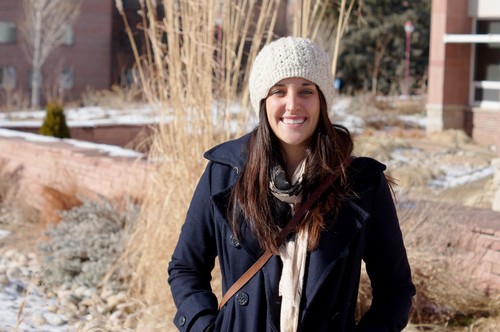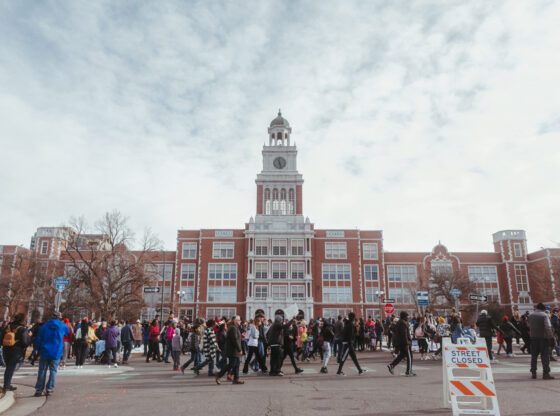 Photo by: Ryan Lumpkin
Photo by: Ryan Lumpkin
Last Wednesday marked the two-year anniversary of the devastating Haiti earthquake, which tugged at the heartstrings of the DU community and the world. At the time of the quake, students united to raise thousands of dollars in relief aid and awareness through fundraisers such as vigils, benefit concerts, barbecues and restaurant galas.
While the hype around Haiti’s condition in the popular press has died down, two members of the DU community continue to keep a close eye on Haitian relief efforts. Alumnus Sarah Leavitt and professor Lynn Holland offer their first-hand commentary on reports of epidemics, poverty and corruption hindering Haiti’s progress.
Sarah Leavitt, a ’10 Masters graduate in International Development from Las Vegas, currently works as the Digital Outreach Manager for the Lambi Fund of Haiti, an organization founded jointly by Haitians and Americans in 1994 that works in partnership with grassroots organizations to improve the livelihood of Haitians, build the economy and support agriculture, clean water and microfinance for Haitians. The fund has offices in Haiti and Denver, where Leavitt serves as the “techie,” modernizing and improving operations and directing updates of the current work in Haiti.
Leavitt got her start in the Lambi fund as an intern while getting her Masters degree at the Josef Korbel School of International Studies. According to Leavitt, the university helped her find the project to fulfill her work-study requirements.
However, Leavitt’s connection to Haiti far precedes her involvement with the Lambi fund. In fact, she said, Haiti is ultimately what brought her to DU.
“Haiti is the entire reason I got involved in international development,” said Leavitt. “When I was 19, I went on a trip to do volunteer work with Haitian refugees who had moved to the Dominican Republic. It was my first look at immense poverty and the unfair living conditions associated with it. That trip inspired my life work. I really saw poverty head on. After that, I was inspired to travel and did more volunteer work. It was serendipitous to get this opportunity – it came full circle with Haiti.”
Leavitt made her most recent visit to Haiti in October, where she stayed for three weeks to work with the Lambi Fund staff stationed in Haiti. During her trip, she frequently worked in the Haitian countryside, strengthening local food production and agriculture, and training and providing financial resources for local business operations.
It may come as no surprise that there was plenty of work left to be done.
“It’s quite difficult, because the situation is complex,” said Leavitt. “Thousands of people live in the tent cities and countryside around Port au Prince. Seven thousand Haitians have died from cholera, and half a million more are infected. Strides have been made in sanitation, such as clean water access and latrines, since my last visit. But there’s still a long way to go, starting with the eradication of cholera for the entire population.”
Lynn Holland, professor of InterAmerican studies at Korbel, agreed sanitation is a major struggle for Haiti’s recovery.
“Recovery remains painfully slow and has left far too many behind,” said Holland. “Despite the expenditure of $2.38 billion, over 600,000 Haitians still live in the 1,000 makeshift camps in the capital city. They are sheltered only by tents, tarps or bed sheets and live without running water, electricity, sewage systems or protection against crime. One study shows that an average of 112 people share a single camp latrine and only 18 percent of the camps have hand-washing facilities.”
Holland, whose research focuses on the political economic challenges of the small states of Central America and the Caribbean, first encountered Haiti while working at an immigrant resettlement program in Chicago over 20 years ago. Here, she learned the importance of U.S. policy toward Central Americans. While both Haitian and Cuban refugees had faced similar hardships before arriving in the U.S., Haitian refugees were subject to long periods of detention and then returned to Haiti to face poverty and repression, while Cubans were readily accepted into the U.S.
Indeed, even Haiti’s current troubles are deeply rooted in their relationships with the policies of the U.S. State Department.
“The earthquake opened the door to even greater levels of foreign involvement. Immediately after it occurred, the Interim Haiti Recovery Commission (IHRC) was formed by the U.S. State Department. It’s important to know that a majority of the members on this commission were non-Haitians. This majority included representatives from each of the major international lenders – the IMF, World Bank and Inter-American Development Bank. Only seven IHRC members, all government appointees, were Haitians.”
Services, too, are essentially run by foreign organizations and non-governmental organizations, said Holland.
“Haiti has been nicknamed ‘The Republic of NGOs’ for having the highest concentration of NGOs in the world,” Holland said. “Despite their good intentions, NGOs are no substitute for a responsive government. When services are funded and directed by outside interests, the public loses a vital link to its own government and the means of making it accountable. Leaders become indifferent to the needs of the larger population.”
Sarah Leavitt expressed similar concerns over the U.S. view of Haiti as “a lost cause.”
“The people are strong and united. They are working together and sharing the burden of struggle together,” said Leavitt. “When you see them at work, they will be singing songs of what they want and where they are going in the future. People of all walks of life – old, young, middle-aged – will all be working in the same organization to build their future. If we put the trust in the people of Haiti, and trust that they know their vision, that’s what will improve their future.”
“I would say that there is definitely a sense by the Haitian people that foreigners think they know best. They need to let Haitians set the priorities. If that were done, there would be more effective engagements,” said Leavitt.
Holland also placed hope in the hands of the Haitians, citing their strength and courage, even in the face of death and imprisonment by their government.
Holland and Leavitt both agree that the most effective thing that any American can do for Haiti is to raise awareness for human rights.
“We can do our part by promoting democracy, opposing military intervention and condemning human rights violations,” said Holland.
“Help tell the story and strengthen the advocacy. Build partnerships and strengthen the voice of the people. ” said Leavitt.










